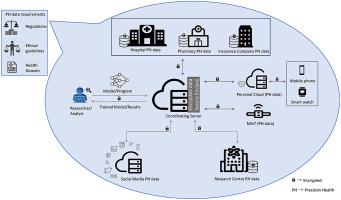Computers in Biology and Medicine ( IF 7.0 ) Pub Date : 2020-11-25 , DOI: 10.1016/j.compbiomed.2020.104130 Chandra Thapa 1 , Seyit Camtepe 1

|
Precision health leverages information from various sources, including omics, lifestyle, environment, social media, medical records, and medical insurance claims to enable personalized care, prevent and predict illness, and precise treatments. It extensively uses sensing technologies (e.g., electronic health monitoring devices), computations (e.g., machine learning), and communication (e.g., interaction between the health data centers). As health data contain sensitive private information, including the identity of patient and carer and medical conditions of the patient, proper care is required at all times. Leakage of these private information affects the personal life, including bullying, high insurance premium, and loss of job due to the medical history. Thus, the security, privacy of and trust on the information are of utmost importance. Moreover, government legislation and ethics committees demand the security and privacy of healthcare data. Besides, the public, who is the data source, always expects the security, privacy, and trust of their data. Otherwise, they can avoid contributing their data to the precision health system. Consequently, as the public is the targeted beneficiary of the system, the effectiveness of precision health diminishes. Herein, in the light of precision health data security, privacy, ethical and regulatory requirements, finding the best methods and techniques for the utilization of the health data, and thus precision health is essential. In this regard, firstly, this paper explores the regulations, ethical guidelines around the world, and domain-specific needs. Then it presents the requirements and investigates the associated challenges. Secondly, this paper investigates secure and privacy-preserving machine learning methods suitable for the computation of precision health data along with their usage in relevant health projects. Finally, it illustrates the best available techniques for precision health data security and privacy with a conceptual system model that enables compliance, ethics clearance, consent management, medical innovations, and developments in the health domain.
中文翻译:

精确的健康数据:数据安全和隐私的要求,挑战和现有技术
精准健康利用各种来源的信息,包括组学,生活方式,环境,社交媒体,医疗记录和医疗保险索赔,以实现个性化护理,预防和预测疾病以及精确治疗。它广泛使用传感技术(例如,电子健康监测设备),计算(例如,机器学习)和通信(例如,健康数据中心之间的交互)。由于健康数据包含敏感的私人信息,包括患者和护理人员的身份以及患者的医疗状况,因此始终需要适当的护理。这些私人信息的泄漏会影响个人生活,包括欺凌,高额保险费以及由于病史造成的失业。因此,信息的安全性,保密性和信任度至关重要。此外,政府立法和道德委员会要求医疗数据的安全性和私密性。此外,作为数据源的公众始终希望获得其数据的安全性,隐私性和信任性。否则,他们可以避免将其数据贡献给精确健康系统。因此,由于公众是该系统的目标受益者,因此精确健康的有效性降低了。在此,根据精确健康数据的安全性,隐私,道德和法规要求,找到用于利用健康数据的最佳方法和技术,因此精确健康是必不可少的。在这方面,本文首先探讨了法规,全球道德准则以及特定领域的需求。然后,它提出了要求并调查了相关的挑战。其次,本文研究了适用于计算精确健康数据及其在相关健康项目中的使用情况的安全且保护隐私的机器学习方法。最后,它通过概念系统模型说明了精确的健康数据安全性和隐私保护的最佳可用技术,该模型可实现合规性,道德规范,同意管理,医疗创新以及健康领域的发展。











































 京公网安备 11010802027423号
京公网安备 11010802027423号